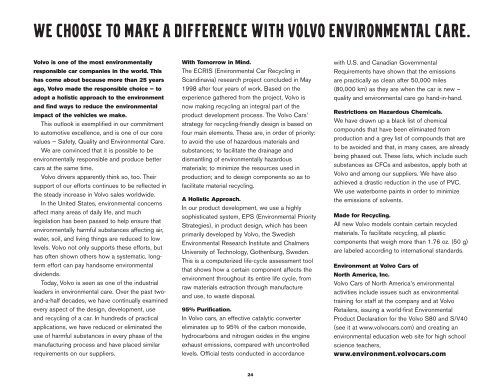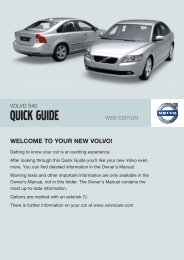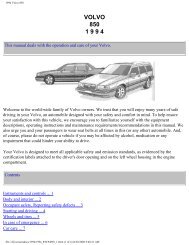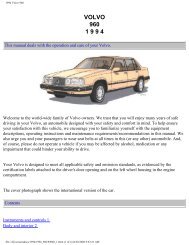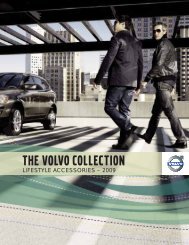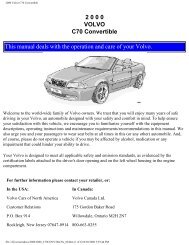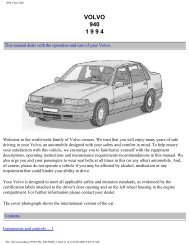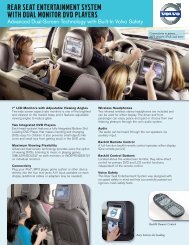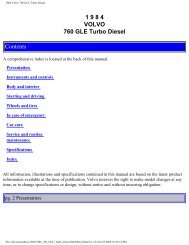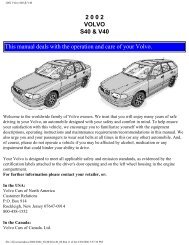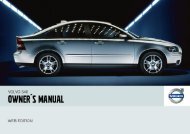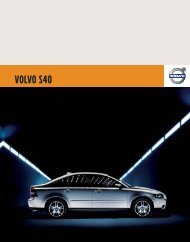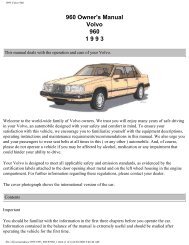s60 Brochure_v2.qxd (Page 1)
s60 Brochure_v2.qxd (Page 1)
s60 Brochure_v2.qxd (Page 1)
Create successful ePaper yourself
Turn your PDF publications into a flip-book with our unique Google optimized e-Paper software.
WE CHOOSE TO MAKE A DIFFERENCE WITH VOLVO ENVIRONMENTAL CARE.<br />
Volvo is one of the most environmentally<br />
responsible car companies in the world. This<br />
has come about because more than 25 years<br />
ago, Volvo made the responsible choice — to<br />
adopt a holistic approach to the environment<br />
and find ways to reduce the environmental<br />
impact of the vehicles we make.<br />
This outlook is exemplified in our commitment<br />
to automotive excellence, and is one of our core<br />
values — Safety, Quality and Environmental Care.<br />
We are convinced that it is possible to be<br />
environmentally responsible and produce better<br />
cars at the same time.<br />
Volvo drivers apparently think so, too. Their<br />
support of our efforts continues to be reflected in<br />
the steady increase in Volvo sales worldwide.<br />
In the United States, environmental concerns<br />
affect many areas of daily life, and much<br />
legislation has been passed to help ensure that<br />
environmentally harmful substances affecting air,<br />
water, soil, and living things are reduced to low<br />
levels. Volvo not only supports these efforts, but<br />
has often shown others how a systematic, longterm<br />
effort can pay handsome environmental<br />
dividends.<br />
Today, Volvo is seen as one of the industrial<br />
leaders in environmental care. Over the past twoand-a-half<br />
decades, we have continually examined<br />
every aspect of the design, development, use<br />
and recycling of a car. In hundreds of practical<br />
applications, we have reduced or eliminated the<br />
use of harmful substances in every phase of the<br />
manufacturing process and have placed similar<br />
requirements on our suppliers.<br />
With Tomorrow in Mind.<br />
The ECRIS (Environmental Car Recycling in<br />
Scandinavia) research project concluded in May<br />
1998 after four years of work. Based on the<br />
experience gathered from the project, Volvo is<br />
now making recycling an integral part of the<br />
product development process. The Volvo Cars’<br />
strategy for recycling-friendly design is based on<br />
four main elements. These are, in order of priority:<br />
to avoid the use of hazardous materials and<br />
substances; to facilitate the drainage and<br />
dismantling of environmentally hazardous<br />
materials; to minimize the resources used in<br />
production; and to design components so as to<br />
facilitate material recycling.<br />
A Holistic Approach.<br />
In our product development, we use a highly<br />
sophisticated system, EPS (Environmental Priority<br />
Strategies), in product design, which has been<br />
primarily developed by Volvo, the Swedish<br />
Environmental Research Institute and Chalmers<br />
University of Technology, Gothenburg, Sweden.<br />
This is a computerized life-cycle assessment tool<br />
that shows how a certain component affects the<br />
environment throughout its entire life cycle, from<br />
raw materials extraction through manufacture<br />
and use, to waste disposal.<br />
95% Purification.<br />
In Volvo cars, an effective catalytic converter<br />
eliminates up to 95% of the carbon monoxide,<br />
hydrocarbons and nitrogen oxides in the engine<br />
exhaust emissions, compared with uncontrolled<br />
levels. Official tests conducted in accordance<br />
with U.S. and Canadian Governmental<br />
Requirements have shown that the emissions<br />
are practically as clean after 50,000 miles<br />
(80,000 km) as they are when the car is new –<br />
quality and environmental care go hand-in-hand.<br />
Restrictions on Hazardous Chemicals.<br />
We have drawn up a black list of chemical<br />
compounds that have been eliminated from<br />
production and a grey list of compounds that are<br />
to be avoided and that, in many cases, are already<br />
being phased out. These lists, which include such<br />
substances as CFCs and asbestos, apply both at<br />
Volvo and among our suppliers. We have also<br />
achieved a drastic reduction in the use of PVC.<br />
We use waterborne paints in order to minimize<br />
the emissions of solvents.<br />
Made for Recycling.<br />
All new Volvo models contain certain recycled<br />
materials. To facilitate recycling, all plastic<br />
components that weigh more than 1.76 oz. (50 g)<br />
are labeled according to international standards.<br />
Environment at Volvo Cars of<br />
North America, Inc.<br />
Volvo Cars of North America’s environmental<br />
activities include issues such as environmental<br />
training for staff at the company and at Volvo<br />
Retailers, issuing a world-first Environmental<br />
Product Declaration for the Volvo S80 and S/V40<br />
(see it at www.volvocars.com) and creating an<br />
environmental education web site for high school<br />
science teachers,<br />
www.environment.volvocars.com<br />
24


